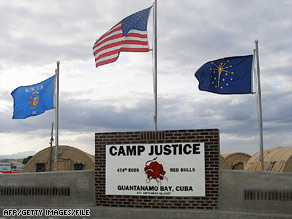applesanity
New member
Justices: Gitmo detainees can challenge detention in U.S. courts
(It continues, but we get the point.)
Obviously I don't know as much when compared to some of the legal minds at TFL, but I think I agree with the majority ruling. My gut feeling is that if these "enemy combantants" are given a trial, the evidence presented could and probably will threaten national security to some extent. Who or where the informants are, the intelligence gathering methods (it'll be a laugh if they're really, really unethical/illegal methods), what future intelligence is known, the extent of anti-terrorism movements, and so on..
So what. But of course, if I put on my "Bush Hater" hat on I could say... there is no evidence. At all. That'll be a real laugh.
Oooohh all the liberal Justices and the one swing Justice ruled against Bush. Them crazy latte-sipping, Prius-driving pinko libbies! Seems to me like that the majority opinion is saying, "the interests of national security is not an excuse to trump the Constitution." (do the "enemy" combatants even have Constitutional rights? I don't know.)
That's one aspect of this ruling. The other aspect is how Bush's administration will comply. Will the trials start next week? Most likely not. In a few months? Ehhhh maybe. Let president #44 inherit the mess? hmmmm.... Or maybe they'll pull an Andrew Jackon!
The Daily Kos has already jumped on the Andrew Jackson analogy too.
Anthony Kennedy has made his decision; now let him enforce it!
Some blog or website or whatever called RedStateNetwork gave a rebuttal of sorts I think.

I don't want this thread to be about the treatment of the prisoners. We can argue that in another thread.
WASHINGTON (CNN) -- Suspected terrorists and foreign fighters held by the U.S. military at Guantanamo Bay, Cuba, have the right to challenge their detention in federal court, the Supreme Court ruled Thursday.
The decision marks another legal blow to the Bush administration's war on terrorism policies.
The 5-4 vote reflects the divide over how much legal autonomy the U.S. military should have to prosecute about 270 prisoners, some of whom have been held for more than six years without charges. Fourteen of them are alleged to be top al Qaeda figures.
Writing for the majority, Justice Anthony Kennedy said, "the laws and Constitution are designed to survive, and remain in force, in extraordinary times. Liberty and security can be reconciled; and in our system reconciled within the framework of the law."
Kennedy, the court's swing vote, was supported by Justices John Paul Stevens, David Souter, Ruth Bader Ginsburg and Stephen Breyer, generally considered the liberal contingent.
At issue was the rights of detainees to contest their imprisonment and challenge the rules set up to try them.
A congressional law passed in 2006 would limit court jurisdiction to hear so-called habeas corpus challenges to detention. It is a legal question the justices have tackled three times since 2004, including Thursday's ruling.
Each time, the justices have ruled against the government's claim that it has the authority to hold people it considers "enemy combatants."
Preliminary hearings have begun in Guantanamo for some of the accused. A military panel this month arraigned five suspected senior al Qaeda detainees, including the alleged mastermind of the September 11 attacks, Khalid Sheikh Mohammed, who was transferred to the prison camp in 2006.
The Bush administration has urged the high court not to get involved in the broader appeals, saying the federal judiciary has no authority to hear such matters.
Four justices agreed. In a sharp dissent, read in part from the bench, Justice Antonin Scalia said the majority "warps our Constitution."
The "nation will live to regret what the court has done today," Scalia said.
He was supported by Chief Justice John Roberts and Justices Clarence Thomas and Samuel Alito.
[...]
(It continues, but we get the point.)
Obviously I don't know as much when compared to some of the legal minds at TFL, but I think I agree with the majority ruling. My gut feeling is that if these "enemy combantants" are given a trial, the evidence presented could and probably will threaten national security to some extent. Who or where the informants are, the intelligence gathering methods (it'll be a laugh if they're really, really unethical/illegal methods), what future intelligence is known, the extent of anti-terrorism movements, and so on..
So what. But of course, if I put on my "Bush Hater" hat on I could say... there is no evidence. At all. That'll be a real laugh.
Oooohh all the liberal Justices and the one swing Justice ruled against Bush. Them crazy latte-sipping, Prius-driving pinko libbies! Seems to me like that the majority opinion is saying, "the interests of national security is not an excuse to trump the Constitution." (do the "enemy" combatants even have Constitutional rights? I don't know.)
That's one aspect of this ruling. The other aspect is how Bush's administration will comply. Will the trials start next week? Most likely not. In a few months? Ehhhh maybe. Let president #44 inherit the mess? hmmmm.... Or maybe they'll pull an Andrew Jackon!
The Daily Kos has already jumped on the Andrew Jackson analogy too.
Anthony Kennedy has made his decision; now let him enforce it!
Some blog or website or whatever called RedStateNetwork gave a rebuttal of sorts I think.

I don't want this thread to be about the treatment of the prisoners. We can argue that in another thread.
